“I ask you to do everything possible to avoid destroying the Church with division, whether it be ideological, or out of greed, ambition and jealousy”.
Pope Francis launched this strong appeal during the Mass he celebrated on Monday morning, 12 September, in the Chapel of Santa Marta. He said that the words St Paul wrote to the Corinthians also apply “to all of us, to the Church today”, and he cited a passage from the First Letter: Brethren, “I do not praise the fact that your meetings are doing more harm than good”, and “first of all, I hear that when you meet as a Church there are divisions among you”.
Recalling Paul’s words, Pope Francis asked that we “above all pray and safeguard the source, the specific root of the unity of the Church, which is the body of Christ, and that we daily celebrate his sacrifice in the Eucharist”. The devil, the Pope explained, “has two powerful weapons for destroying the Church: division and money”.
Before reflecting on the passage of St Paul proposed in the liturgy, Pope Francis wanted to offer a practical, simple and direct testimony. “Today the Lord gives us a grace, the grace of memory”, he said at the very beginning of his homily, in this way presenting Msgr Arturo Antonio Szymanski Ramírez, “a brother Bishop who has done so much for the council”. The elderly Mexican Bishop concelebrated at the Mass with the Pope, and exchanged the sign of peace with him. On Friday, 9 September, the Pope had received him in an Audience. “At 95 years of age he continues to work, helping parishes”, Pope Francis said, inviting those present to give thanks to the Lord especially “for the grace of memory”.
Archbishop Szymanski Ramírez, Archbishop emeritus of San Luis Potosí, was born on 17 January, 1922. A priest since 1947 and bishop since 1960, he took part in the work of the Second Vatican Council, seated (on account of his Slavik name) between Cardinal Stefan Wyszyński and Archbishop Karol Wojtyła, and was frequently in contact with Joseph Ratzinger. Retiring from his position as first Archbishop of San Luis Potosí on 20 January, 1999, Archbishop Szymanski Ramírez has never ceased to humbly serve his people.
In his meditation Pope Francis thus drew inspiration from the passage of the First Letter of St Paul to the Corinthians (11:17-26). The Apostle, he noted, reproaches his interlocutors “because there are divisions” among them: “He rebukes them for the division that is among them, they are divided: they fight, one on one side, and one on the other”. And “division destroys the fabric of the Church”. Moreover, the Pope explained, “the devil has two powerful weapons for destroying the Church: divisions and money”. He destroys “with these two weapons”. However, this has been from the beginning: “the divisions in the Church have been there since the beginning; the greed for money too”.
In this regard, the Pope recalled the struggles, including “theological and ideological divisions”, which “tore at the Church: the devil sows jealousy, ambition and ideas, but only to divide! Or he sows greed: let us remember Ananias and Sapphira, in the early times”.
Because, he remarked, “since the early times there were divisions, and division causes destruction in the Church: divisions destroy, like a war: after a war everything is destroyed and the devil goes away pleased”.
But “being naive, we are playing his game”, Pope Francis said, adding: “And I will say more about war: the war of divisions is a dirty war, it is like terrorism. Let us look at a clear example: when in a Christian community — be it a parish, college or institution, whatever it might be — you gossip, you drop a bomb to destroy the other”; and in this way “the other is destroyed and I am fine, and I can continue”. This is “the terrorism of gossip!”. The Pope pointed out that the Apostle James “also said: the tongue kills; it drops a bomb, therefore, it destroys and I remain”.
“There are divisions among you”: Pope Francis repeated Paul’s words to the Corinthians. And, he continued, “the divisions in the Church do not allow the kingdom of God to grow; they do not allow the Lord to be seen clearly, as He is”. Instead, “the divisions mean that you see only this part, and that other part is opposed to this: always opposed, there is no oil of unity, the balm of unity”.
“But the devil goes further”, Pope Francis warned, stating: “Not only in the Christian community, he goes to the very root of Christian unity”. And this is what “happens here, in the city of Corinth, to the Corinthians: Paul rebukes them because the divisions go to the very root of unity, in other words, to the Eucharistic celebration”. In this case the rich prepare “to eat, to celebrate; the poor do not, they have a bit of bread and nothing more in their celebration”. The Apostle writes: “Do you not have houses in which you can eat and drink? Or do you show contempt for the Church of God and make those who have nothing feel ashamed?”.
Therefore, the Pope explained, that Paul “takes this, he stops and remembers: ‘Be careful. For I received from the Lord what I also handed on to you, that the Lord Jesus, on the night he was handed over…’; and he recalls, as we heard, the institution of the Eucharist, the first Eucharistic celebration”. Moreover, Pope Francis said, “the root of unity is in the Eucharistic celebration”. And “the Lord prayed to the Father that ‘they may be one even as we are one’, he prayed for unity”. However, “the devil seeks to destroy all the way” to the root.
At this point Pope Francis launched his appeal to “do everything possible to avoid destroying the Church with division, whether it be ideological, or out of greed, ambition and jealousy”. And above all “to pray and safeguard the source, the specific root of the unity of the Church, which is the body of Christ, and that we daily celebrate his sacrifice in the Eucharist”. The words Paul wrote to the Corinthians apply to us too: he asks us to not gather together “for the better” and not “for the worst”, warning against being a Church “gathered for the worst, for division: for the worst, to soil the body of Christ, in the Eucharistic celebration”. And “Paul himself tells us, in another passage:
‘Whoever, therefore, eats the bread or drinks the cup of the Lord in an unworthy manner… eats and drinks judgement upon himself’”.
In conclusion, Pope Francis asked the Lord in prayer for the “unity of the Church, that there be no divisions”. And also for unity “in the root of the Church, which is precisely the sacrifice of Christ, which we celebrate every day”.

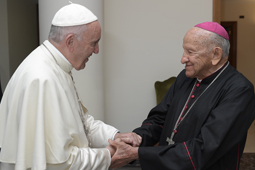
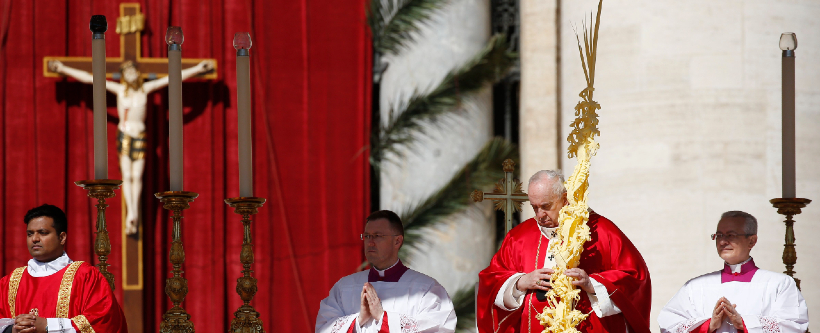
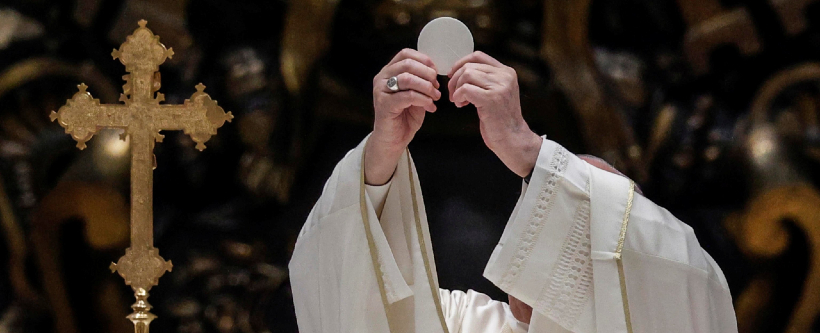
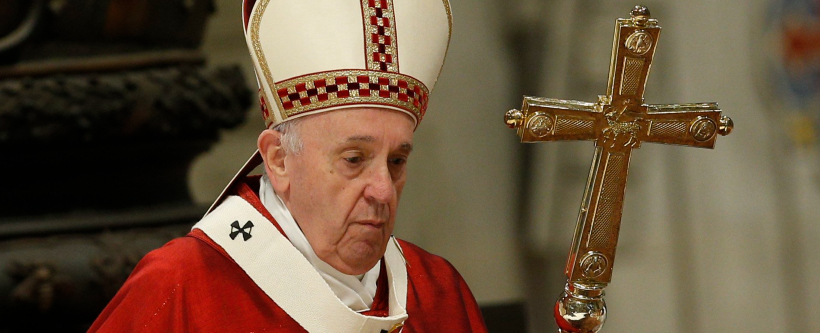
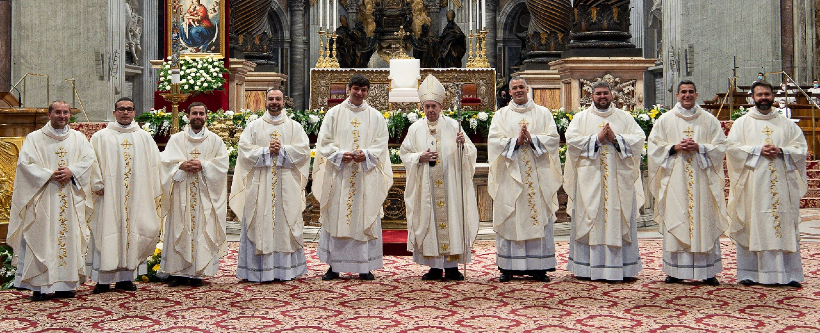
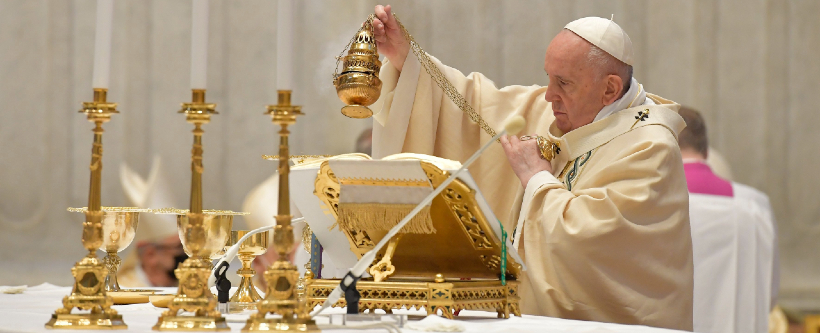
Facebook Comments